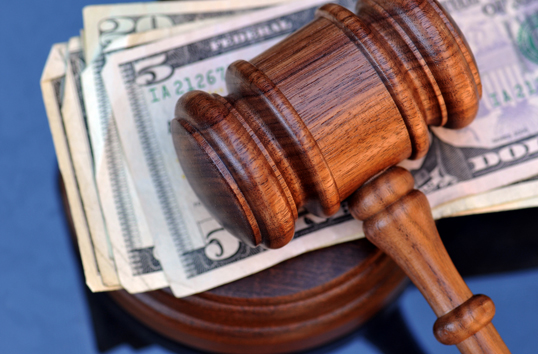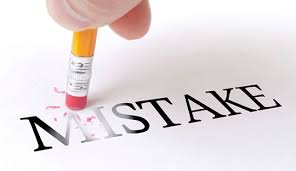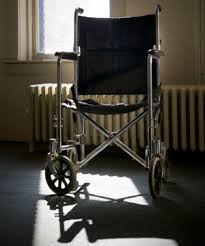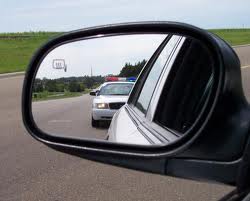Child Support in California – What You Need to Know
How is child support determined?
In California child support is calculated using a statewide guideline. The formula used is somewhat complex but the courts, and your attorney, will utilize one of the licensed computer programs to determine the amount. The calculation is based upon the number of children to be supported, the incomes of both parents, the amount of visitation time each parent has, tax filing status, who pays for the healthcare coverage for the children and some other expenses. This information is obtained by the court, or your attorney, when you, and the other parent, complete the Income and Expense Declaration (FL-150) and attach your pay stubs.
What if you cannot afford to pay child support?
The amount of support generated by the guideline calculator may be more than you think you can afford. In such a case the court has some discretion to adjust this amount. You will have to prove that you have a hardship that the court should consider when asking the court to deviate from the guideline support. A common hardship that the court will consider when making adjustments to guideline child support is that one parent is supporting a child from another relationship.
What if the other parent is not paying support?
In many cases the parent ordered to pay support fails to do so. If you find yourself in this situation you do have some options. First, you can consult with and hire an attorney to assist you in collecting support. In addition to getting the other parent to pay the ongoing monthly support amount you may be entitled to unpaid back support. Your attorney can get an order from the court allowing you to attach the wages of the parent who has been ordered to pay support. Additionally, you can, with the assistance of your attorney, file contempt proceedings against the non-paying parent for violation of the court order to pay child support. Another option is to contact the Department Child Support Services in your county. This agency can assist you in obtaining your child support.
Is there a limit to the amount of child support you will have to pay?
Not in California. The guideline support calculation is presumed to be the legal calculation in most cases regardless of the amount. In some limited cases the court can deviate from the guideline amount.
Are all income sources considered when calculating child support?
The California Family Code provides that income from all sources is considered. This would include income from your job, self employment, investment income or interest, rental income, unemployment benefits and most other sources of income earned by both parents will be considered for the purpose of calculating child support. However, the court is not required to rely solely upon the income reported on a tax return. In many cases a party may have significant tax deductions which reduce the amount of earned income reported to the IRS. Depending on the nature of these deductions the court may add these back into the income of the parent in making a determination of child support.
Can you insist that child support be used exclusively for the child?
Unfortunately it is assumed that child support is used to benefit the child and there is little the court can do to ensure that this occurs. California Family Code does not specify that the support be used for any specific purpose and the receiving parent does not have to provide an accounting for the use of the support. It is presumed that certain living expenses such as mortgage, rent, utilities and food are for the benefit of the supported child.
Do you have to pay for any other expenses of the child?
Yes. Just because you pay support does not mean that your financial obligations end there. Many additional expenses have to be paid by both parents. These expenses include extracurricular activities, day care, school tuition, non-covered medical, vision, orthodontic, dental expenses and co-pays.
Can the amount of child support be changed later?
Yes. Child support is always modifiable when there has been a change in circumstances. This may include a change in the visitation time, a change in the income of either parent, or the birth of another child from a different relationship.
What should I do now?
In all cases it is advised that you seek the advice of an attorney with experience in family law and child support cases. The Ewing Law Group has attorneys with over 20 years of legal experience and we have handled hundreds of child support cases to establish, enforce or modify support. Visit the Ewing Law Group web page and call to schedule your consultation today.
Clean Up Your Criminal Record
“Expungement” is a term used when referring to a process of cleaning up your criminal record. In this process you request that the court reopen your criminal case, withdraw the plea or guilty verdict, dismiss the charges and re-close the case without a conviction. In effect, you are no longer a convicted person.
However, not all convictions can be dismissed. Expungement is limited to cases in which the defendant was convicted of a misdemeanor or a felony that could have been charged as a misdemeanor, and was sentenced to county jail time, probation, a fine, or a combination of those three. Additionally, the Penal Codes permitting expungement of criminal records expressly prohibit certain types of convictions from being dismissed. Most of these exceptions involve serious vehicle code violations or sexual offenses against minors. A detailed list of exceptions see California Penal Code section 1203.4
What Expungement Does Not Do
Although you conviction may be dismissed, restrictions resulting from the conviction cannot. Specifically, an expungement does not:
Remove the conviction from your criminal history. California and FBI criminal history records will still show the conviction and the subsequent dismissal.
Seal the court case file from public inspection. The court file remains public record.
Reinstate your right to possess firearms. In some cases, reduction of a non-violent felony to a misdemeanor may accomplish this.
Allow you to omit the conviction from application for government employment. If you are applying for a government job, a job that requires security clearance, or a job that requires a government-issued license, certificate, or permit, you must disclose the conviction and expungement.
Prevent the conviction from being used as a “prior.” The dismissed conviction can be used for determining sentencing enhancements in subsequent convictions.
Prevent the conviction from being used by the DMV. Expunged convictions may be used to suspend or revoke driving privileges.
What are the benefits of Expungement?
For mist people the benefits of expungement far outweigh these restrictions. first, under California Labor Code (Lab) 432.7, employers cannot ask about arrests that did not end in conviction, convictions that have been judicially dismissed, or about any diversion or similar programs. Once a conviction has been expunged, it becomes an arrest that did not end in conviction. Legally, you may answer “no” to these types of questions when applying for a job with a private employer.
In some situations, the conviction may prevent you from obtaining employment but having the conviction expunged will not. Many employers and military recruiters will ask that you have your record expunged prior to employment or enlistment in the military.
Do You Qualify for Expungement?
Your conviction must meet the guidelines described in California Penal Code section 1203.4, 1203.4(a) or Penal Code section 17. At least one year must have passed since your conviction. You must have completed the terms of your sentence such as payment of all fines and completion of alternative sentencing programs. You also cannot be serving a sentence for any offense, or be charged with the commission of any other offense. You must not have received another conviction within one year of the first, and probation must not have been revoked, and not reinstated.
Can I Request Expungement without an Attorney?
Yes. Most counties have a self-help center with the required forms to completed to request your expungement. However, the people at the self-help center are not attorneys and cannot give you legal advice. They can assist you in obtaining the proper forms and filing but cannot help you in completing the forms and answering any legal questions you may have.
Hiring experienced legal counsel to assist you with your expungement is not expensive. Call the EWING LAW GROUP at (916) 668-6786 to schedule a FREE consultation with one of our attorneys.
Obtaining Justice for Our Clients
Here is a great article from the Sacramento Bee about one of our clients.
http://www.sacbee.com/2014/09/03/6677119/davis-theater-vp-hurt-in-fall.html
Elder Abuse Incidents on the Rise
Reports of serious, physical, sexual, financial and verbal abuse are numerous among our nursing homes and in-home care providers. The rate of nursing home abuse has been steadily rising since 1996.
Elder mistreatment (i.e. abuse and neglect) is defined as intentional actions that cause harm or create a serious risk of harm to a vulnerable elder by a caregiver or other person who stands in a trust relationship to the elder. This includes failure by a caregiver to satisfy the elder’s basic needs or to protect the elder from harm.
Signs of Abuse
Common signs of elder abuse include untreated bedsores, inadequate medical care, malnutrition, dehydration, preventable accidents, and inadequate sanitation and hygiene. If you have placed a loved one in a nursing home it is important that you monitor all of these signs as well as changes in mood or behavior, signs of lethargy and changes in sleeping habits.
While some of these examples may be the common signs and symptoms of aging, it is important that you be vigilant in your observations and documentation of these signs. Too often in-home care providers and nursing home employees are not properly trained or supervised. Some of the most common forms of abuse are over medication and poor hygiene. Some abuse cases have shown that nursing homes will intentionally over medicate their patients to keep them asleep to make caring for them easier on staff and therefore requiring fewer employees per shift. This form of abuse generally will go unnoticed for some time and usually leads to issues of hygiene and sanitation.
Possible Causes of Abuse
Reductions in state and federal financial support, mostly though Medicaid and MediCal (in California) have caused many nursing homes to reduces wages and staff. Additionally, due to state and budget restrictions, inspections and enforcement of state and federal rules regarding nursing home conditions has fallen drastically.
The number of qualified and licensed vocational nurses, aides and certified nursing assistants means less qualified and under educated staff taking care of our aging loved ones. And due to the relatively low wages paid to aides and assistants ($7 to $9 per hour average) there are not enough people entering the field.
Who Are the Abusers?
Unfortunately the majority of abusers of the elderly are relatives of victim. Unqualified and undereducated care givers, whether in private in-home care or at nursing homes, are also common abusers in elder abuse cases.
Be Proactive
Elderly patients may be scared to report abuse for many reasons. In some cases they have been threatened or intimidated into remaining silent. Therefore your loved one, friend or neighbor may not immediately report to you abuse that is occurring to themselves or others. Ask questions, look around, monitor medications and attend their doctor visits if you can. Also, keep an eye on your elderly neighbors and relatives. Plus I am sure they would appreciate the visit.
There are many good care providers and nursing homes that meet and or exceed the government standards. However, if you believe there are signs of abuse the first thing you need to do is remove the person from the facility if possible. If you are not in the position to remove the victim from the facility, or keep the care provider away, contact law enforcement and report the problem.
If you believe your family member has been the victim of elder abuse give the EWING LAW GROUP a call to set up a free consultation.
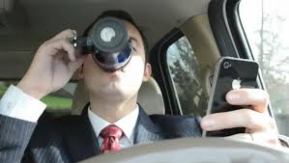 California law prohibits the use of a cell phone while driving unless you are using a hands-free device. Specifically, California Vehicle Code section 23123 (a) states:
California law prohibits the use of a cell phone while driving unless you are using a hands-free device. Specifically, California Vehicle Code section 23123 (a) states:
“A person shall not drive a motor vehicle while using a wireless telephone unless that telephone is specifically designed and configured to allow hands-free listening and talking, and is used in that manner while driving.”
California Vehicle Code section 23123.5 includes texting and emailing. But, according to a recent Appellate Court decision you can do just about anything else.
A few months ago, the Fifth District Court of Appeals examined California’s hands-free statute and held that it only applies to “listening and talking,” not any use of a phone whatsoever. So it appears that the use of navigation software, music and just about any other app is allowed while driving … Score one for Candy Crush Saga and Word With Friends.
The case involved a Mr. Spriggs of Fresno, California who was driving when his route was interrupted by construction. What did he do? He pulled out his smartphone and and began to look for an alternate route using his navigation app. What he didn’t notice was the Highway Patrol officer next to his vehicle. He was stopped and issued a ticket for violation of California Vehicle Code section 23123.
Mr. Spriggs fought the ticket and lost in court. Not one to back down Mr. Spriggs kept fighting until the Fifth Appellate District took up his case where he argued that “he did not violate the [hands-free] statute because he was not talking on the telephone.” The Court agreed with Mr. Spriggs stating:
“[The] statute specifically states the telephone must be used in a manner that allows for “hands-free listening and talking.” (§ 23123(a).) It does not state that it must be used in a manner that allows for hands-free looking, hands-free operation or hands-free use, or for anything other than listening and talking. Had the Legislature intended to prohibit drivers from holding the telephone and using it for all purposes, it would not have limited the telephone’s required design and configuration to “hands-free listening and talking,” but would have used broader language, such as “hands-free operation” or “hands-free use.”
Does this mean you are free to fling an Angry Bird or do some Candy Crushing? Not really. First, it is still not safe and we all have seen way too many accidents caused by distracted driving whether it was because of hot coffee spilling in your lap, an ill-timed lipstick touch-up, changing the radio station or using a smartphone. Additionally, the California Highway Patrol and other local law enforcement agencies have indicated that while there is not a specific Vehicle Code section for “distracted driving” they intend on citing people for violation of California Vehicle Code section 22350 which states:
“No person shall drive a vehicle upon a highway at a speed greater than is reasonable or prudent having due regard for weather, visibility, the traffic on, and the surface and width of, the highway, and in no event at a speed which endangers the safety of persons or property”
What this means is that law enforcement will cite you for violation of this statute by claiming that your use of a smartphone made driving at any speed unsafe. So, how fast is too fast while sipping a latte, applying make-up or checking your smartphone is now a vague matter of officer discretion.
The best decision you can make though is to use a hands-free device and put the phone down.
“Wet Reckless” and California DUI Cases
Just because you were arrested for a DUI (VC 23152(a), VC 23152(b)) does not necessarily mean you will be convicted of that charge.
With an experienced attorney in your corner, and depending on the facts of your case, your DUI charge may be reduced to what is commonly referred to as a “Wet Reckless.” What is a wet reckless? A California “wet reckless” (VC 23103, per VC 23103.5) is generally the first level of DUI reduction that will be offered. The “wet” in a wet reckless merely implies that you were involved in a reckless driving offense wherein alcohol or drugs were involved.
A “wet reckless” may be offered, or your attorney may successfully negotiate for this reduced plea, in cases where your BAC is close to 0.08% or there is a weakness in the prosecution’s case and the District Attorney would rather get some conviction rather than losing at trial.
While there are some definite advantages to a wet reckless there are also some disadvantages.
ADVANTAGES
Shorter County Jail Sentences
Conviction of a DUI in California under VC 23152(a), VC 23152(b) carries a maximum jail sentence of six months, and up to a year for a second or third offense within a ten (10) year period. A conviction of a wet reckless under VC 23103, per VC 23103.5 has a 90-day limitation.
This is an important distinction in the event of a violation of probation. If, during the period of your probation, you are convicted of a new offense, the judge could impose a probation violation and sentence you to jail time. However, you cannot be placed in custody for a period greater than the maximum sentence of the offense for which you were convicted and probation was granted.
Reduced Fines
The maximum fine for both a “wet reckless” (VC 23103, per VC 23103.5) and DUI (VC 23152(a), VC 23152(b)) is $1,000. However, this does not include the penalties and assessments added to the base fines and your fines could easily exceed $3,000.
The fines imposed for “wet reckless” convictions are generally half or less of what you would pay if convicted of a DUI pursuant to (VC 23152(a), VC 23152(b)).
Shorter DUI School
Typically a “wet reckless” conviction will include only a six-week alcohol education program. If you are convicted of a DUI you could receive a three-month, six-month or nine-month, depending on your BAC, alcohol education program. However, if you receive another “wet reckless” or DUI conviction within ten years of your first conviction you will be required to attend a nine-month program. A conviction of a second or a third DUI within ten years of your “wet reckless” conviction will result in an 18 month or 30 month program.
No Mandatory Sentencing Enhancements for Repeat Offenders
For every DUI conviction in California there is a ten year “look back” period. What this means is that the court will look at your record as far back as ten years to see if there are any other DUI convictions, even in other states in some circumstances, and if any they will affect your current charges and sentence.
For example a conviction of a 2nd DUI within the ten year period will result in a mandatory minimum sentence of 96 hours in jail. A conviction of a 3rd DUI within the ten year period will result in a mandatory minimum sentence of 120 days in jail. These are just minimum sentencing guidelines and many counties take a much tougher stance on DUI offenders and impose much greater sentences.
However a “wet reckless” carries no such minimum sentencing and no mandatory jail time.
Shorter Probation Period
Conviction of a DUI will generally include a probationary period of three to five years. The probation period for a “wet reckless” generally is only for one or two years. This is important because when you are on probation this can often show up on a prospective employer’s background check.
DISADVANTAGES
You May Still Lose Your License
Although a “wet reckless” conviction does not trigger an automatic license suspension, the DMV will still impose one if your BAC was 0.08% or higher, and you lose your DMV Administrative Hearing. In fact, you can have your case entirely dismissed by the court and the DMV can still suspend your license.
Wet Reckless Convictions Count as Prior Offenses
If you get arrested for a DUI within ten years of your “wet reckless” conviction, the “wet reckless” conviction will count as a prior DUI and you may be charged with a 2nd DUI face harsher sentences and fines.
Your Insurance Company May Still Treat it as a DUI
Your insurance company may treat the “wet reckless” conviction as a DUI for purposes of cancelling your policy or raising your premiums.
In every case you are best served by hiring an experienced DUI attorney to assist you. Only an experienced attorney with knowledge of California’s complex DUI laws can obtain the best results for you when you are charged with a DUI.
Contact theEWING LAW GROUP today for a FREE CONSULTATION.
Supreme Court: Anonymous 911 Tip Good for Warrantless Search
The US Supreme Court ruled (5-4) on Tuesday in Navarette v. California to uphold a traffic stop in northern California in which officers subsequently found marijuana in the vehicle. The officers themselves did not see any evidence of the tipped reckless driving, which was interpreted as drunkenness, even after following the truck for several minutes.
Justice Clarence Thomas said the anonymous tip phoned in to 911 that a Ford pickup truck had run the caller off the road was sufficiently reliable to allow for the traffic stop without violating the driver’s constitutional rights.
In 2008, officers stopped Lorenzo Prado Navarette based on the anonymous 911 call which claimed that Navarette had run the caller off the road. When officers questioned Navarette they smelled marijuana and later found 30 pounds of marijuana in the vehicle and arrested Navarette and a passenger.
Navarette and the passenger moved to suppress the the evidence based on an argument that the search violated their Fourth Amendment rights because the officers lacked reasonable suspicion when they pulled them over. In the Supreme Court opinion authored by Justice Clarance Thomas, the majority found that an an anonymous tip will not always lead to reasonable suspicion, but in this case it did. This of course could leave the door open to future litigation on the issue under different facts. The Court held that reasonableness of suspicion is based on the totality of of the circumstances, including: content of information possessed by the police and reliability of that information. The Court found that under appropriate circumstances an anonymous tip can demonstrate sufficient indicia of reliability to provide reasonable suspicion to make an investigatory stop.
But Justice Antonin Scalia, who wrote the dissent, and in which he was joined by Justices Ruth Bader Ginsburg, had strong words about the decision’s implications for the future. Law enforcement agencies will identify at once our new rule: So long as the caller identifies where the car is, anonymous claims of a single instance of possibly careless or reckless driving, called in to 911, will support a traffic stop. This is not my concept, and I am sure would not be the Framers’, of a people secure from unreasonable searches and seizures.
Justice Scalia continued to point out that anonymity is especially suspicious with respect to the call that is the subject of the present case. The Court’s opinion serves up a freedom-destroying cocktail consisting of two parts patent falsity: (1) that anonymous 911 reports of traffic violations are reliable so long as they correctly identify a car and its location, and (2) that a single instance of careless or reckless driving necessarily supports a reasonable suspicion of drunkenness. All the malevolent 911 caller need do is assert a traffic violation, and the targeted car will be stopped, forcibly if necessary, by the police. If the driver turns out not to be drunk (which will almost always be the case), the caller need fear no consequences, even if 911 knows his identity. After all, he never alleged drunkenness, but merely called in a traffic violation—and on that point his word is as good as his victim’s.
Finally, Justice Scalia noted that drunken driving is a serious matter, but so is the loss of our freedom to come and go as we please without police interference. To prevent and detect murder we do not allow searches without probable cause or targeted Terry stops without reasonable suspicion. We should not do so for drunken driving either. After today’s opinion all of us on the road, and not just drug dealers, are at risk of having our freedom of movement curtailed on suspicion of drunkenness, based upon a phone tip, true or false, of a single instance of careless driving.
Scalia and Ginsburg appear to share this writer’s opinion that this new rule will open the door for abuses by law enforcement or harassment from citizens making baseless 911 calls. Additionally, it now seems to place the burden on the defendant to prove that the facts surrounding the warrantless stop based on an anonymous 911 call did not rise to the level of Navarette v. California.
.
Bad Lawyers are No Joke

“We have all heard “lawyer jokes” and it is well known that if you want to hear a good one, ask a lawyer. Most of these jokes, while often getting laughs, do not place lawyers in a very good light. Like all professions there are good lawyers and bad lawyers. Unfortunately, like most professions, the stories of the bad ones seem to get the most attention. Until recently I never had the misfortune to have a first-hand experience with one of the really bad lawyers.
It started about 18 months ago when I was contacted by “Bruce” who had concerns about his injury case and the attorney he had trusted to help him. His case was a good one in that liability was clear, he had underwent multiple surgeries, his medical bills were approaching $500,000, and the defendant company had what appeared to be a considerable liability policy. The problem was that the case had been going on for over 3 years and Bruce was getting inconsistent and confusing communication from his attorney.
When I met with Bruce and saw the paperwork he had, I was immediately concerned. The statute of limitations had passed, and while his attorney had told him that the case had been filed I could find no evidence of this anywhere. Bruce retained my office. I immediately tried to contact his former attorney and got no response. My next call was to the insurance company for the defendant. After a few minutes on the phone with the insurance adjuster I was told that Bruce’s claim had settled over two years ago for less than $50,000.
After reviewing the copies of the signed release and cashed settlement check, which the adjuster was kind enough to send to my office, it was clear that these were forged by Bruce’s former attorney. Needless to say I was shocked and angered that an attorney would do this to a client. I also had the unfortunate experience of contacting Bruce and telling him the bad news.
Fast forward to today. I reported this attorney to the Bar. As it turns out this was not this attorney’s first brush with discipline by the Bar and he is on his way to losing his license for good. This attorney is also currently facing multiple felony charges and will likely be going to jail for these and other crimes committed against his clients.
Anyone, especially attorneys, reading this should be angered by this story. This attorney’s actions have irreparably injured a person who will never fully recover for his injuries, and harmed the reputation of all attorneys. I have done what I can for Isaac in getting some recovery for him, by ensuring that his former attorney will never practice law again, and by reporting his crimes to the District Attorney. Yet despite all my efforts neither I nor Bruce feel much satisfaction.
So the next time someone says, “Did you hear the one about the attorney who cheated his client?”, just remember that joke does not have a funny punch line.
Need a New Divorce Attorney?
Do You Need a New Divorce Lawyer?
Finding the right divorce and family law attorney is critical to success in resolving your case. However, knowing when to get a new attorney is also important.
There are many good Family Law and Divorce lawyers, however, there are some that don’t measure up and fall short either professionally, interpersonally, or ethically. Unfortunately, you may not know this for some time after you have retained your attorney. It is important to know that you do have the right to fire your attorney and seek new counsel at any time.
Here are just a few signs that you may need to search for a new Family Law/Divorce attorney:
1. Poor Communication
One of the biggest complaints which often result in disciplinary proceedings against attorneys is poor or no communication with their clients. If you are more familiar with your attorney’s secretary or paralegal, or worse their voice mail, than with your attorney there is a problem. Does it often take days or weeks to receive a reply to your emails or telephone calls? If so there is a problem. This is not only unprofessional and rude but attorneys have an ethical duty to communicate with their clients.
If this describes your attorney you may want to consider dropping that attorney and finding another.
2. Unethical or Unprofessional Tactics
We have all seen the sensationalized television dramas showcasing the overly-aggressive and often unethical attorney. While this makes for good television ratings those sleazy tactics do not translate well to real life practicing attorneys. Those attorneys who utilize unethical or unprofessional tactics are soon known to their legal community and are not respected. This lack of respect will not help your attorney to resolve your case.
Being verbally abusive to your ex spouse or other attorneys is not the way to get things accomplished. All this will do is create a more litigious environment and lead to delays in resolving your case.
If your attorney is unethical with judges and other attorneys this may also carry over to you and your billing. Do not wait to find a new attorney if this is the case.
3. Making Major Decisions Without Consulting You
Your divorce or Family Law matter is YOURS. It does not belong to your attorney. You are the one who should be making the major decisions with the advice and input of your attorney. Of course you hire an attorney so you do not have to handle every little detail yourself, but when it comes to the major decisions that will affect you for a long time you expect and deserve to be consulted.
4. Questionable Billing Practices
Many Family Law/Divorce attorneys charge an initial retainer then bill their hourly rate against that retainer. However, not all attorneys do and instead charge you a flat-rate fee for the services you request. Unfortunately, for those charging hourly rates the temptation is to bill for everything and keep the case going on for as long as the money keeps coming. There is no incentive for the attorney to achieve settlement. Additionally, one of the many complaints made to the State Bar is questionable billing practices such as charging their clients for hours that they did not work on their case.
If your attorney is reluctant to send you billing statements, or if those statements seem to have exaggerated hourly charges, you should be looking for a new attorney.
5. Obvious Lack of Experience
Did your attorney promise you the world but later seems to be not delivering on those promises? Has your attorney missed filing deadlines or is late or a “no show” for hearings? Does it appear that your attorney is disliked or disrespected by other attorney and judges? If any of these apply you should be looking for a new attorney.
Arrested?
Being arrested for Driving Under the Influence (DUI), drug possession/sale, theft or any other criminal offense can have serious life consequences which may affect you for years to come. California state and local law enforcement, district attorneys and judges take a hard stance on DUI and other criminal charges. However, it is not the end of the world and my office can help you through this difficult time. A thorough review of your case by an exerienced attorney will ensure your rights have not been violated.
If you have been arrested for any criminal offense in Sacramento County, Placer County, Yolo County, El Dorado County or anywhere in California I can help you and ensure that your rights are protected.
Call today to schedule your FREE consultation (916) 596-1040.
